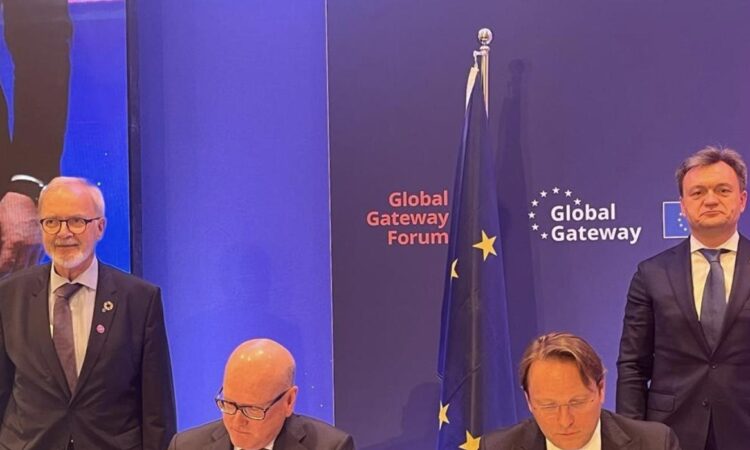
At the Global Gateway Forum, EU Commissioner for Neighbourhood and Enlargement Negotiations Olivér Várhelyi and European Investment Bank’sPresident Werner Hoyer formalised a financial package by which the European Commission will provide an investment grant of €12 million in the EIB Global’s project to rehabilitate and modernise two key sections of railway lines in the Republic of Moldova. Supported by a forthcoming loan of €42 million from EIB Global, the upgraded railway infrastructure will not only enhance internal connectivity in the Republic of Moldova, but also offer a crucial export route for Ukraine, further strengthening the Solidarity Lanes initiative and fostering regional stability and economic resilience.
Central to this project will be rehabilitation of the Republic of Moldova’s North-South railway corridor, a critical link from Western Ukraine to key Danube and Prut River ports with access to international waters. The improved existing railway connection between the Republic of Moldova and Ukraine aims to boost trade and benefit both the Republic of Moldova’s economy and Ukrainian exports, particularly in the context of the EU-Ukraine Solidarity Lanes initiative.
The initiative, to be implemented by Moldovan Railways (Calea Ferata din Moldova, or CFM), focuses on the rehabilitation of railway infrastructure on the Republic of Moldova’s Valcinet – Ungheni – Chisinau – Cainari corridor. This project is part of an overarching country’s reform, targeting improvement of the existing rail infrastructure and in longer term the harmonisation of the Republic of Moldova’s railway network with EU standards and practices.
Beyond immediate infrastructural improvements of the Republic of Moldova’s key railway infrastructure, the project supports Moldova’s efforts to act in the spirit of solidarity with its neighbors and improve the crucial route of Solidarity Lanes. It also demonstrates the commitment of the EU and its bank, EIB, to supporting neighbouring countries in times of need.
EU Commissioner for Neighbourhood and Enlargement Negotiations Olivér Várhelyi said: “I am pleased to see our Solidarity Lanes initiative delivering in Moldova. This project is a great example showing where our joint efforts lead to tangible results. As Moldova becomes an integral part of the circulation of goods, people, and services, upgrading the country’s transport infrastructure is imperative. Therefore, I am glad that this investment will strengthen the resilience of Moldovan railway infrastructure, improve Moldova’s connectivity with Ukraine and Europe, and benefit the Moldovan economy. In the context of our Economic and Investment Plan for the Eastern Partnership, we will continue to upgrade all the necessary routes.”
EIB President Werner Hoyer said: “The €12 million contribution to the Republic of Moldova’s rail infrastructure, to be complemented by an EIB loan, is a sign of the partnership and shared goals between Moldova and the EU. It will improve the Republic of Moldova’s economic prospects and support regional connectivity with Ukraine in these difficult times. The Republic of Moldova can count on the EU Bank’s financial and technical support to upgrade its infrastructure through quality projects.”
Observing the signing of the investment grant to the Republic of Moldova at the Global Gateway Forum, Prime Minister of the Republic of Moldova Dorin Recean said: “We are gratefulto both the EU Commission and the EIB for supporting our efforts in developing a modern and efficient rail network in the Republic of Moldova. The rehabilitation of the North – South rail corridor in the country, which is a project of particular importance in the context of the Solidarity Lanes, will bring long-term economic benefits to the whole region in these difficult times. The project represents a well-integrated part of our endeavor to fully integrate the Republic of Moldova into the European rail network. In view of achieving this objective, we further strongly rely on the EIB and EU support.”
Background information
EIB Global is the EIB Group’s new specialisedarm dedicated to increasing the impact of international partnerships and development finance outside of the European Union. EIB Global is designed to foster strong, focused partnership within Team Europe, and as part of the EU’s Global Gateway strategy alongside fellow development finance institutions, and civil society. EIB Global brings the Group closer to local people, companies and institutions through our offices across the world.
EIB Global and the Republic of Moldova: Since establishing its presence in the Republic of Moldova in 2007, the EIB has channelled over €1.19 billion into 33 projects, backing EU policy objectives across multiple sectors, such as transport, energy, SMEs, agriculture, and municipal infrastructure. 2022 was a record year for the EIB in the Republic of Moldova, with €250 million worth of new loans signed with the public sector. 2023 saw the Bank extend its first corporate loan in the Republic of Moldova — a $30 million project with Premier Energy Distribution, the Republic of Moldova’s private electricity distribution system operator, aimed at enhancing the quality and reliability of the electrical power network.
The Global Gateway Forum brings together for the first time an assembly of government representatives from the European Union and across the globe, alongside key stakeholders from the private sector, civil society, thought leaders, financial institutions, and international organisations to promote global investment in transformative infrastructure – hard and soft – to deliver on Sustainable Development Goals.
Global Gateway is the EU’s positive offer to reduce the worldwide investment gap and boost smart, clean and secure connections in digital, energy and transport sectors, and to strengthen health, education and research systems. The Global Gateway strategy embodies a Team Europe approach that brings together the European Union, EU Member States, and European development finance institutions. Together, it aims to mobilize up to €300 billion in public and private investments from 2021 to 2027, creating essential links rather than dependencies, and closing the global investment gap.





